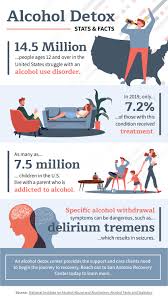Alcohol detoxification, or detox, is the process of safely removing alcohol from the body in a medically supervised setting. It is often the first step for individuals seeking treatment for alcohol use disorder (AUD). Hospital-based alcohol detox provides a safe and controlled environment for managing withdrawal symptoms and preparing patients for ongoing treatment and recovery.In this comprehensive article, we will explore the benefits of hospital-based alcohol detox, the detox process, medications used, and what to expect during and after detox. We will also discuss the importance of seeking professional help and the various treatment options available for AUD.
Benefits of Hospital-Based Alcohol Detox
Hospital-based alcohol detox offers several advantages over detoxing at home or in an outpatient setting:
Medical Supervision
Hospital-based detox provides 24/7 medical supervision by trained professionals, including physicians, nurses, and addiction specialists. This ensures that any medical complications or severe withdrawal symptoms can be promptly identified and managed.
Also Read>>
The Role of an Oncologist: Everything You Need to Know
Tailored Detox Plans
Each patient’s detox plan is tailored to their unique needs, taking into account factors such as the severity of their AUD, the presence of co-occurring medical or mental health conditions, and their overall health status. This personalized approach helps maximize the effectiveness of the detox process.
Supportive Therapies
Hospital-based detox often includes supportive therapies, such as counseling, group therapy, and educational sessions, to help patients cope with cravings, manage stress, and develop healthy coping mechanisms. These therapies lay the foundation for long-term recovery.
Reduced Risk of Complications
Attempting to detox from alcohol without medical supervision can be dangerous, as it increases the risk of severe complications, such as seizures, delirium tremens (DTs), and even death. Hospital-based detox significantly reduces these risks by providing appropriate medications and close monitoring.
Increased Likelihood of Completing Detox
Patients who undergo hospital-based detox are more likely to complete the process and transition to ongoing treatment, as they receive constant support and encouragement from the medical staff. This continuity of care is crucial for maintaining sobriety and preventing relapse.
The Alcohol Detox Process in Hospital Settings
The alcohol detox process in a hospital setting typically consists of three stages: admission, acute withdrawal treatment, and post-acute withdrawal treatment.
Stage 1: Admission
During the admission stage, patients undergo a comprehensive assessment by the medical team, which includes:
- A review of their medical and substance use history
- A physical examination
- Laboratory tests to determine the severity of their AUD and identify any underlying health issues
- An assessment of their mental health status
Based on this assessment, the medical team develops a personalized detox plan that may include medications to manage withdrawal symptoms and any co-occurring conditions.
Stage 2: Acute Withdrawal Treatment
The acute withdrawal stage typically begins 6-12 hours after the patient’s last drink and can last up to a week. During this stage, patients experience a range of physical and psychological symptoms as their body adjusts to the absence of alcohol. Common symptoms include:
- Anxiety
- Irritability
- Insomnia
- Intense cravings
- Tremors
- Nausea
- Sweating
In some cases, more severe symptoms may occur, such as seizures, hallucinations, and delirium tremens (DTs). These severe symptoms can be life-threatening and require immediate medical intervention. During the acute withdrawal stage, patients are closely monitored by the medical staff, and medications are administered as needed to alleviate symptoms and prevent complications. The goal of this stage is to safely manage withdrawal and stabilize the patient’s physical and mental health.
Trending Post>>
Understanding Prostate Cancer: A Comprehensive Guide to Diagnosis, Treatment, and Prevention
Stage 3: Post-Acute Withdrawal Treatment
The post-acute withdrawal stage involves managing lingering withdrawal symptoms and transitioning the patient to ongoing treatment. During this stage, patients may continue to experience emotional and psychological symptoms, such as mood swings, cravings, fatigue, and difficulty concentrating. The medical team continues to monitor the patient’s progress and may adjust medications as needed. Patients also begin to engage in supportive therapies, such as counseling and group therapy, to help them develop coping strategies and prepare for the next phase of their recovery.
Medications Used During Detox
Medications are often used during alcohol detox to alleviate withdrawal symptoms and prevent complications. The most commonly used medications include:
Benzodiazepines
Benzodiazepines, such as Librium, Ativan, and Tranxene, are commonly used to alleviate alcohol withdrawal symptoms and prevent alcohol withdrawal seizures. These medications work by mimicking the effects of alcohol in the brain, reducing the severity of withdrawal symptoms.
Anticonvulsants
Anticonvulsant medications, such as Keppra, are often used in combination with benzodiazepines to prevent alcohol withdrawal seizures. Seizures are one of the most common causes of fatality in alcohol withdrawal, so anticonvulsants play a crucial role in reducing this risk.
Antidepressants
Antidepressants may be prescribed to patients with co-occurring depression or anxiety disorders. These medications can help alleviate mood-related symptoms and improve overall mental health during the recovery process.
Anti-nausea and Anti-seizure Medications
Additional medications, such as anti-nausea and anti-seizure drugs, may be prescribed to manage specific withdrawal symptoms and prevent complications. It is important to note that the use of medications during detox should be closely monitored by the medical team to ensure safety and effectiveness. The dosage and duration of medication may vary depending on the individual patient’s needs and response to treatment.
What to Expect During and After Detox
Patients can expect a range of experiences during and after hospital-based alcohol detox:
During Detox
- Close medical monitoring and support from the medical staff
- Administration of medications to manage withdrawal symptoms and prevent complications
- Participation in supportive therapies, such as counseling and group therapy
- Adherence to a structured daily routine, including meals, rest, and activities
After Detox
- Continued participation in supportive therapies and ongoing treatment, such as intensive outpatient programs or residential treatment
- Development of a comprehensive aftercare plan to prevent relapse and support long-term recovery
- Ongoing monitoring and support from the medical team and addiction specialists
- Participation in support groups, such as Alcoholics Anonymous (AA), to build a strong social support network
It is important to note that the length of stay in the hospital during detox can vary depending on the individual patient’s needs and the severity of their AUD. Most patients complete detox within 7-14 days, but some may require a longer stay depending on their progress and response to treatment.
Seeking Professional Help
Attempting to detox from alcohol without professional help can be dangerous and even life-threatening. It is crucial to seek professional help from a qualified healthcare provider or addiction treatment facility to ensure a safe and effective detox process.When seeking professional help, patients can expect:
- A comprehensive assessment of their AUD and overall health status
- Development of a personalized detox and treatment plan
- Close medical monitoring and support throughout the detox process
- Referral to ongoing treatment and support services after detox
Patients should be prepared to provide information about their alcohol use history, including the amount and frequency of consumption, any previous attempts at quitting or reducing alcohol use, and any co-occurring medical or mental health conditions.
Treatment Options After Detox
After completing hospital-based alcohol detox, patients will need to continue their recovery journey through ongoing treatment and support services. Treatment options may include:
Inpatient Rehabilitation (Rehab)
Inpatient rehab programs provide 24/7 care in a residential setting, allowing patients to focus solely on their recovery. These programs typically last 30-90 days and include a range of therapies, such as individual and group counseling, family therapy, and educational sessions.
Intensive Outpatient Program (IOP)
Intensive outpatient programs provide a structured treatment plan that allows patients to live at home while attending treatment several times per week. IOPs typically include individual and group counseling, as well as educational sessions and support groups.
Outpatient Treatment
Outpatient treatment programs provide a less intensive level of care, with patients attending individual or group therapy sessions on a weekly or bi-weekly basis. These programs are often used as a step-down from inpatient rehab or IOP, or as a primary treatment option for patients with mild to moderate AUD.
Medication-Assisted Treatment (MAT)
Medication-assisted treatment combines the use of FDA-approved medications, such as naltrexone, acamprosate, or disulfiram, with behavioral therapies to treat AUD. MAT can help reduce cravings, prevent relapse, and improve overall treatment outcomes.
Support Groups
Support groups, such as Alcoholics Anonymous (AA) and SMART Recovery, provide a community-based approach to recovery. These groups offer peer support, educational resources, and strategies for maintaining sobriety. The choice of treatment option will depend on the individual patient’s needs, preferences, and the severity of their AUD. It is important to work closely with healthcare providers and addiction specialists to develop a comprehensive treatment plan that addresses all aspects of recovery, including physical, mental, and social well-being.
Conclusion
Hospital-based alcohol detox is a crucial first step in the recovery process for individuals struggling with alcohol use disorder. By providing a safe, medically supervised environment, hospital-based detox helps manage withdrawal symptoms, prevent complications, and prepare patients for ongoing treatment and support services.Throughout the detox process, patients receive personalized care from a team of healthcare professionals, including physicians, nurses, and addiction specialists. Medications may be used to alleviate withdrawal symptoms and prevent complications, while supportive therapies help patients develop coping strategies and prepare for long-term recovery.After completing detox, patients will need to continue their recovery journey through ongoing treatment options, such as inpatient rehabilitation, intensive outpatient programs, outpatient treatment, medication-assisted treatment, and support groups. By seeking professional help and engaging in a comprehensive treatment plan, individuals with AUD can achieve long-term sobriety and improve their overall health and well-being.
Be the first to get new scholarships, job updates, inspiring Fazza poems, lifestyle stories, and more — straight to your inbox.


